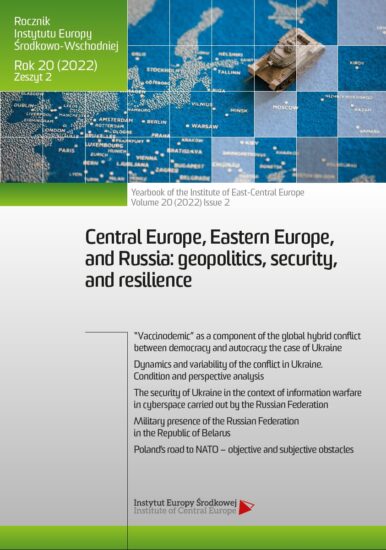„Oni nie współpracują z ludźmi”. Władza a społeczeństwo obywatelskie we współczesnej Serbii
ORCID: Agnieszka Ziętek: 0000-0002-1590-3064
Afiliacja: Maria Curie-Skłodowska University in Lublin, Poland
Pages: 187-203
Edition: Lublin 2022
DOI: https://doi.org/10.36874/RIESW.2022.2.11
Citation method: A. Ziętek, “They don’t work with people”. The authorities and civil society in contemporary Serbia, „Rocznik Instytutu Europy Środkowo-Wschodniej” 20(2022), z. 2, s. 187-203, DOI: https://doi.org/10.36874/RIESW.2022.2.11.
Keywords: civil society, contemporary Serbia, grassroots movements, participation
Abstract: The article discusses the condition of civil society in contemporary Serbia, with special emphasis on the relations between its representatives and the authorities (both at the local and state level). The main objective of the analyses is to answer the question of the position of the civil sector within Serbia’s broadly understood political system. What role do both formal non-governmental organizations and grassroots non-institutionalized social movements play in this relatively young democracy? What is the attitude of the authorities to grassroots civil activities, which often manifest criticism towards the decisions and actions of those in power? These questions will constitute the central axis of my considerations in this article. The research problem indicated above is analysed on two essential levels. Firstly, the article discusses existing studies and research on the nature of civil society in Serbia and the ways in which it functions. Secondly, the author analyses the results of qualitative research carried out at the late 2018 and early 2019 among representatives of Serbian civil movements and organizations. The conclusions stemming from these analyses are presented in the final part of the article. The analyses carried out indicate the problems that face the civil sector in Serbia. First and foremost, one should draw attention to the authorities’ rather negative view of the civil sector. What is also noteworthy is an extended network of connections of the authorities with the private sector as well as with right-wing, nationalist, pro-government organizations. These circumstances to a large extent hinder or even preclude dialogue (and further cooperation) between public and civil institutions.
Bibliography:
Almond G., Verba S., Civic Culture: Political Attitudes and Democracy in Five Nations, Princeton 1963.
Bates T. R., Gramsci and the Theory of Hegemony, “Journal of the History of Ideas” 1975, vol. 36, no. 2.
De Tocqueville A., O demokracji w Ameryce, M. Król (trans.), Warsaw 1976.
Fagan A., Europe’s Balkan Dilemma: Paths to Civil Society or State-Building?, London 2010.
Fagan A., Ostojic M., The UE and Civil Society in Serbia: Governance Rather Than Politics, “Balkanologie” 2008, vol. 11, no. 1-2, http://journals.openedition.org/balkanologie/1393.
Gramsci A., Zeszyty filozoficzne, S. Krzemień-Ojak (ed.), Warsaw 1991.
Kuźniar R., Pozimnowojenne Dwudziestolecie 1989–2010, Warsaw 2011.
Matković A., Ivković M., Neoliberal Instrumentalism and the Fight Against It: The “We Won’t Let Belgrade D(r)own” Movement, “East European Politics” 2018, vol. 34.
Mikuš M., Civil Society and EU Integration of Serbia: Toward a Historical Anthropology of Globalizing Postsocialist Europe, [in:] Rethinking Ethnography in Central Europe, H. Cervinkova, M. Buchowski, Z. Uherek (eds.), New York 2015.
Okraska T., Ewolucja ładu światowego w okresie pozimnowojennym (zarys problemu), “Studia Politicae Universitatis Silesiensis” 2013, vol. 11.
Putnam R., Leonardi R., Nanetti R. Y., Making Democracy Work: Civic Traditions in Modern Italy, New Jersey 1994.
Spasic I., Civil Society in Serbia after Milošević: Between Authoritarianism and Wishful Thinking, “Polish Sociological Review” 2003, no. 4(144).
Ziętek A., Lewicki M., Rogaczewska M., Stimulating Social and Economic Development through Culture: An Analysis of Twelve Cultural Initiative
Oriented Towards Transforming Their Local Environment, [in:] I. Stokfiszewski (ed.), Culture and Development: Beyond Neoliberal Reason, Institute for Advanced Study, Warsaw 2017.

PDF: Download